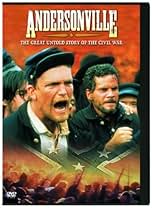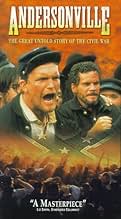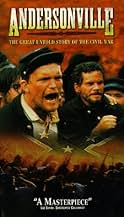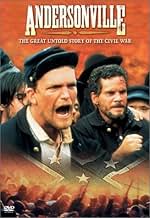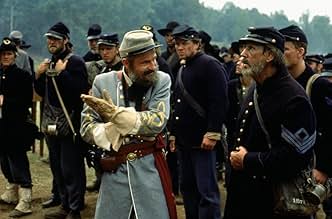CALIFICACIÓN DE IMDb
7.3/10
2.2 k
TU CALIFICACIÓN
La historia del campo de prisioneros de guerra confederados más notorio de la Guerra Civil estadounidense.La historia del campo de prisioneros de guerra confederados más notorio de la Guerra Civil estadounidense.La historia del campo de prisioneros de guerra confederados más notorio de la Guerra Civil estadounidense.
- Ganó 1 premio Primetime Emmy
- 3 premios ganados y 10 nominaciones en total
Explorar episodios
Opiniones destacadas
My opinion is that Andersonville is the best Civil War movie ever made, period. As a former Civil War reenactor, I'm not going to sit here and nitpick at all the "mistakes." Were there mistakes? Sure. The timeline was a little fuzzy for one. But that does not detract from the power of this movie. The guards were not well fed regulars either, but so what? You don't have to take a test after watching this movie!
I think the REAL factor in Andersonville being such a great production was the fact that you had no real "name" people involved. Fredric Forrest may have been the biggest name in the film and is a career role actor - but WHAT an actor! These guys busted their balls for this film and it really shows. I heard one reenactor complain that the characters seemed "cartoonish," and I don't buy it. I bet he was refering to Jan Triska who played Wirz. Well, read up on Wirz. I think they got it pretty close.
Forgive me, my reenacting brethern, but alhough Gettysburg was a tolerable film (I got to be an extra in that) and Gods and Generals was a disaster, the problem with these productions was the fact that they relied way too heavily on reenactors. Reenactors are NOT actors! They were used most effectively in Glory, not so well in Gettysburg, and Gods and Generals? Don't want to even go there. Andersonville followed Glory's success formula in using reenactors as background with small parts filled in by them (my buddy Martin Leibschner playing the banjo in the Raider camp was a good use of the talent reenactors can bring to film).
Frankenheimer must be given a lot of credit, as should the writer. The script did get a little cheesy here and there, but not enough again to trash the overall production. Jarrod Emick (sp?) as Josiah Day did a nice job, but until that point he had been a stage actor mostly, and his voice inflections projected that. Still, he did a great job. Peter Murnik as Limber Jim added that "mystery character" to the film well (as the real Limber Jim who was at Andersonville is a mystery to history). Again, I can't think of one lame performance by any of the key actors here. They put 110% into the job and I commend them for it. And whoever was involved in the set design was on the ball too. To try and recreate that place was no small task.
I remember a reenactor bitching because for the "filling" of the stockade for the wide shots, they had to use women and even cardboard figures. Big frekin deal! When they are dots on the screen, did it REALLY matter?
I can't see this movie being topped in terms of a Civil War period piece. Hollywierd is always bent on turning just about every period piece into some type of romance for the younger target audience. Andersonville is certainly a refreshing change of pace to that drill.
I think the REAL factor in Andersonville being such a great production was the fact that you had no real "name" people involved. Fredric Forrest may have been the biggest name in the film and is a career role actor - but WHAT an actor! These guys busted their balls for this film and it really shows. I heard one reenactor complain that the characters seemed "cartoonish," and I don't buy it. I bet he was refering to Jan Triska who played Wirz. Well, read up on Wirz. I think they got it pretty close.
Forgive me, my reenacting brethern, but alhough Gettysburg was a tolerable film (I got to be an extra in that) and Gods and Generals was a disaster, the problem with these productions was the fact that they relied way too heavily on reenactors. Reenactors are NOT actors! They were used most effectively in Glory, not so well in Gettysburg, and Gods and Generals? Don't want to even go there. Andersonville followed Glory's success formula in using reenactors as background with small parts filled in by them (my buddy Martin Leibschner playing the banjo in the Raider camp was a good use of the talent reenactors can bring to film).
Frankenheimer must be given a lot of credit, as should the writer. The script did get a little cheesy here and there, but not enough again to trash the overall production. Jarrod Emick (sp?) as Josiah Day did a nice job, but until that point he had been a stage actor mostly, and his voice inflections projected that. Still, he did a great job. Peter Murnik as Limber Jim added that "mystery character" to the film well (as the real Limber Jim who was at Andersonville is a mystery to history). Again, I can't think of one lame performance by any of the key actors here. They put 110% into the job and I commend them for it. And whoever was involved in the set design was on the ball too. To try and recreate that place was no small task.
I remember a reenactor bitching because for the "filling" of the stockade for the wide shots, they had to use women and even cardboard figures. Big frekin deal! When they are dots on the screen, did it REALLY matter?
I can't see this movie being topped in terms of a Civil War period piece. Hollywierd is always bent on turning just about every period piece into some type of romance for the younger target audience. Andersonville is certainly a refreshing change of pace to that drill.
John Frankenheimer pain stakingly chronicles prisoners of war struggling to survive in an ill run Confederate prison camp during the Civil War. New prisoners are savagely introduced to the pecking order in this small pit of hell. Strong images support the story line for this well written and produced epic. Featured cast members in this trial of humanity are:Frederic Forrest, William Sanderson, Jarrod Emick, Jayce Bartok, Cliff De Young, Justin Henry and William H. Macy. It is hard to find fault in this glimpse of the notorious place called Andersonville.
This is a sobering, if perhaps a bit too long, recreation of life in the notorious Confederate Camp Sumter (better known as Andersonville after the neighbouring community) which housed almost 50000 Union prisoners of war during the last year and a half of the Civil War. I found it difficult to determine from what perspective the story was being told - which perhaps makes it a fairly balanced movie. There's no doubt that the Confederate guards were portrayed as ruthless, and that Captain Henry Wirtz, the Camp's commander, was portrayed as both ruthless and perhaps a bit insane, but the bulk of the movie really deals with the problem of factionalism between the Union prisoners, as a group known as the "Raiders" establish their own ruthless control over the other prisoners, stealing from them, withholding supplies from them and sometimes murdering them. The first half of the movie dealt largely with this internal conflict, and was very interesting. The point at which the rest of the prisoners rebelled against them and finally, with Wirtz's approval, put them on trial, seemed to mark a transition in the movie. After their trial and the execution of the ringleaders, the movie took on more of an air of hopelessness (and perhaps became a bit less interesting), as the prisoners await a liberation that, in the movie at least, never comes, as the movie ends with the prisoners being transferred to other prisons.
The movie begins somewhat abruptly with Union soldiers captured in battle being sent into the hellhole that was Andersonville, but there was no real historical context given. It might have been more interesting to see the camp from the beginning, and to trace the descent of the camp into what it became. The whole Andersonville issue is historically controversial, and the movie alludes to the controversy, with Wirtz pleading with a Confederate colonel sent to inspect the camp for more supplies, and many today think Wirtz was unfairly condemned after the war for a situation that was largely out of his control. I thought his portrayal in the movie was fair. Others complain that conditions in Union camps were also harsh, but that's neither here nor there for the purposes of evaluating this movie, which certainly presented a sobering enough look at the conditions in this particular camp - which was, after all, its purpose.
The movie features not a stellar cast (there are some fairly well known faces, but no mega-stars) but a solid cast that did a pretty good job with their roles. 7/10
The movie begins somewhat abruptly with Union soldiers captured in battle being sent into the hellhole that was Andersonville, but there was no real historical context given. It might have been more interesting to see the camp from the beginning, and to trace the descent of the camp into what it became. The whole Andersonville issue is historically controversial, and the movie alludes to the controversy, with Wirtz pleading with a Confederate colonel sent to inspect the camp for more supplies, and many today think Wirtz was unfairly condemned after the war for a situation that was largely out of his control. I thought his portrayal in the movie was fair. Others complain that conditions in Union camps were also harsh, but that's neither here nor there for the purposes of evaluating this movie, which certainly presented a sobering enough look at the conditions in this particular camp - which was, after all, its purpose.
The movie features not a stellar cast (there are some fairly well known faces, but no mega-stars) but a solid cast that did a pretty good job with their roles. 7/10
This film won three awards and was nominated for several others. The directing, acting, editing, script and cinematography are all of a high standard. It seemed quite authentic, and this is confirmed by the comment below. Even if you do not normally like 'films of this type', this film is worth watching or even studying, because of the overall excellence.
An admiration of the quality of this film is probably the reason that the brutal story that it portrays did not place a heavy or negative feeling upon me. Lesser films would contaminate the story with adding romance, light comedy or bright flashbacks. This film powerfully gives the viewer a strong sense of realism.
An admiration of the quality of this film is probably the reason that the brutal story that it portrays did not place a heavy or negative feeling upon me. Lesser films would contaminate the story with adding romance, light comedy or bright flashbacks. This film powerfully gives the viewer a strong sense of realism.
The American Civil War, and Union soldiers are imprisoned at Andersonville, a crude stockade establishment presided over by the inept and cruel Captain Henry Wirz. It would prove to be a another dark and soul destroying chapter from the war.
Lets get it out there right away, Andersonville was not the only hell hole prison operating during the American Civil War. Information from both sides of the coin is available on line for those wishing to explore further. That said, Andersonville is a story that deserved and is needed to be told, and this John Frankenheimer directed two - parter brings it vividly into the viewers' lives.
In filmic substance terms it has all the standard POW movie cliche's. We follow a group of prisoners and a group of "convict bullies", with those in authority observing menacingly and proving desperately carefree as to the conditions of the prison and of humane traits in general.
But as formulaic as it ultimately is, there's a determination by the makers to keep the characterisations real and viable, and they achieve this in spades. Pic is also boosted by superb period detail, costuming is grade "A", while the production and art design for the prison is harrowingly effective.
Frankenheimer's tracking shots brings home the enormity of the misery, while Gary Chang's score is thankfully never bombastic. Cast are a mixed bag - to be expected in such a large ensemble piece - and you can't help but yearn for more of William H. Macy.
Yet even though 30 minutes could easily have been shaved off of the run time, Andersonville is a production that should stay with you. The coda serving to remind us that that should be the case. 7/10
Lets get it out there right away, Andersonville was not the only hell hole prison operating during the American Civil War. Information from both sides of the coin is available on line for those wishing to explore further. That said, Andersonville is a story that deserved and is needed to be told, and this John Frankenheimer directed two - parter brings it vividly into the viewers' lives.
In filmic substance terms it has all the standard POW movie cliche's. We follow a group of prisoners and a group of "convict bullies", with those in authority observing menacingly and proving desperately carefree as to the conditions of the prison and of humane traits in general.
But as formulaic as it ultimately is, there's a determination by the makers to keep the characterisations real and viable, and they achieve this in spades. Pic is also boosted by superb period detail, costuming is grade "A", while the production and art design for the prison is harrowingly effective.
Frankenheimer's tracking shots brings home the enormity of the misery, while Gary Chang's score is thankfully never bombastic. Cast are a mixed bag - to be expected in such a large ensemble piece - and you can't help but yearn for more of William H. Macy.
Yet even though 30 minutes could easily have been shaved off of the run time, Andersonville is a production that should stay with you. The coda serving to remind us that that should be the case. 7/10
¿Sabías que…?
- TriviaAt some point during production, several reels of film were lost on the way from a shooting location in Georgia to printing in California. Director John Frankenheimer had to reshoot the lost footage, which was about 40% of the trial sequence, in a new location in North Carolina, rebuilding parts of the original set to the last detail in order to match the coinciding Georgia scenes.
- Citas
Sgt. McSpadden: And what do you call this little piece of heaven?
Capt. Wirz: This? This is Andersonville.
- ConexionesFeatured in The 48th Annual Primetime Emmy Awards (1996)
Selecciones populares
Inicia sesión para calificar y agrega a la lista de videos para obtener recomendaciones personalizadas
- How many seasons does Andersonville have?Con tecnología de Alexa
Detalles
- Tiempo de ejecución1 hora 24 minutos
- Color
- Mezcla de sonido
- Relación de aspecto
- 1.85 : 1
Contribuir a esta página
Sugiere una edición o agrega el contenido que falta

Principales brechas de datos
By what name was Andersonville (1996) officially released in Canada in English?
Responda

